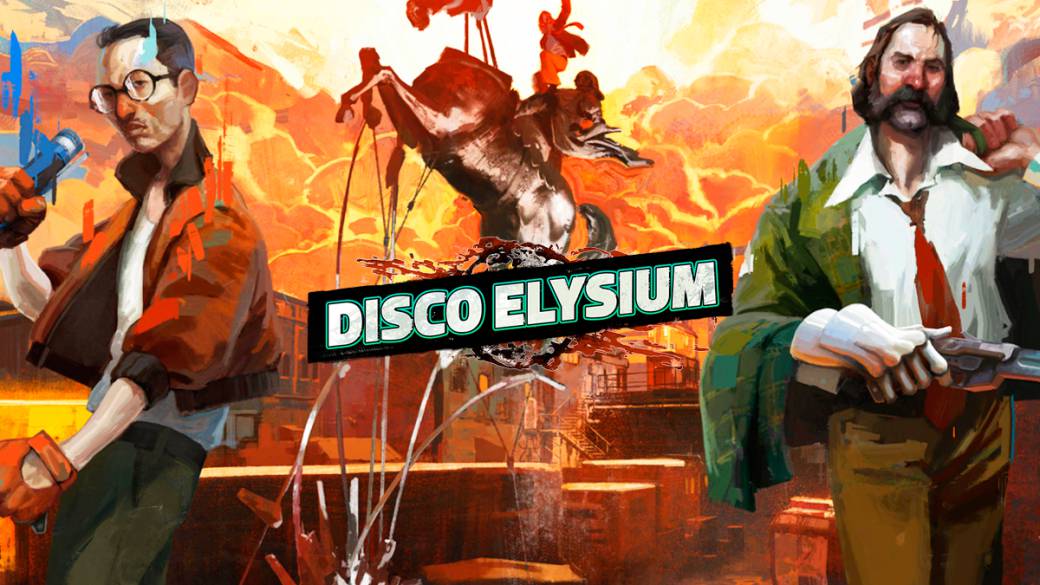
From Estonia we get one of the most interesting and necessary games of the genre in recent years. A demonstration of interactive narrative.
There is an impossible border to overcome between the traditional table role and the video game role. The second is still a way of representing and automating the most tedious processes of the first: the application and interpretation of the rules, the visual expression of our environment, the execution of combat systems … It is not difficult to imagine why a part of the original AD&D players put their sight on the computers given the soup of tables, dice, statistics and items to consider in a game. But the impassable wall between the two worlds is clearly that of the imagination. Today it seems complicated that a program is capable of emulating the theater element of a role-playing game, the improvisation between humans and the range of actions, reactions, questions and answers that occurs between a group and its director.
That is why a majority of RPGs set their sights on combat, their natural terrain, and less those who try it for the narrative side. It is easier to create a visually spectacular world and colorful combat than to try to create complex dialogues with a multitude of ramifications that must be taken into account. Most large commercial productions are committed to keeping this aspect as contained as possible: the script, the dialogues and the characters can be better or worse, but the general structure usually presents the right options and the ramifications strictly necessary to show that there is a choice , but to a certain extent. On the other hand, the bravest developments in this aspect are rare, but they are among the most celebrated examples of the genre: Planescape Torment, Fallout, New Vegas, Baldur's Gate, KOTOR … are the names that have transcended thanks to their ability to raise the narrative interactive, both for the quality of prose and for the complicated and suggestive network of decisions and consequences that they have managed to create.
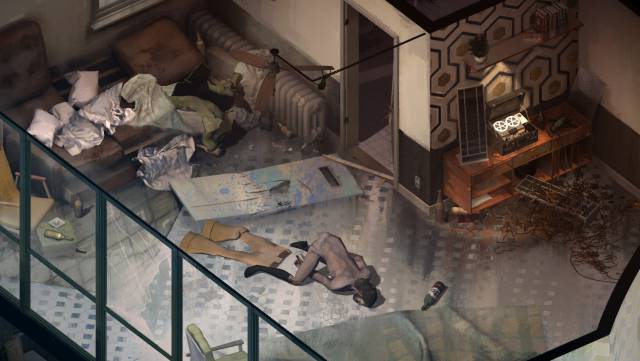
They are not the only ones. In more independent lands we find brilliant gems like King of the Dragon Pass or Age of Decadence, titles that have been able to interpret the desire of many players to play, to define themselves elaborately in a virtual world. It's not about choosing what profession, or what clothes, or what skills your character has. It's about being able to establish your place in the world, and that that world understands what you want to be, reacting to it in a coherent way. And the only way to get something satisfactory in that regard is to sit down to write and make sure that the game has enough lines of dialogue, ramifications and systems to accommodate the greatest number of options that players want to try for their characters.
This is what ZA / UM has understood, which defines itself as a "cultural movement" and, in fact, did not start with anything related to video games. In the group, artists, musicians and writers came together to support and launch their ideas to the world. As their creators say, the idea of creating a video game from Estonia seemed “ridiculous”, but the pieces were fitting in the wake of a self-created board role-playing game, a fictional world with an elaborate background that had already been devised and various aspects of the creative work of the group, which ended up coming together in a desire to take advantage of the means to create a new speaker with which to give free rein to the creativity of the team.
Thus, the project initially known as “No Truce with The Furies” took shape, although its conceptualization already had several years behind its back before the idea of making a video game with that material was raised. This detail is important because it serves to understand one of the main virtues that can be seen within a few hours of starting the title: the amount of detail, credibility and the tangible results of the world in which we are. There are 17 years of conceptualization of this world: six continents, more than 100 countries, 200 cities, 6000 thousand years of history contemplate us, all tied by a refined and refined system of rules during a decade of intense play at the hands of one of the most recognized game directors of the Tallinn role scene. This world was already well defined and structured long before the game's own history was formed, and it shows.
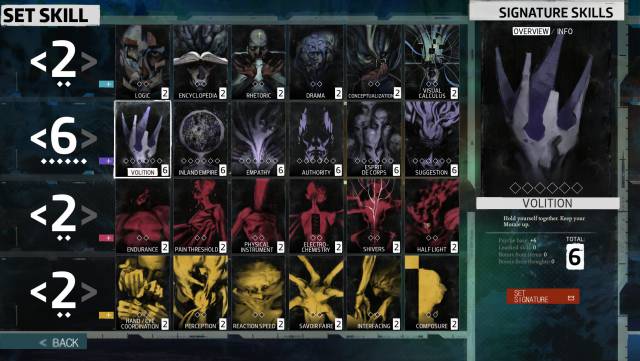
Fantastic realism
Far from offering us a vast world to travel, the real scene of Disco Elysium is very small, a tiny and depressed corner called Martinaise in Revachol, once the "capital of the world", a nation with a proud history that ended a bloody civil war and the intervention of a powerful international foreign force, an alliance of different nations that are now the ones that set the pace of a humiliated country – and a good part of the free world. But all this does not concern us directly, we are not here in the midst of a great mission that affects the destiny of nations: we are a policeman investigating a murder case in one of the most forgotten corners of the capital and our main problem is far from geopolitics: a colossal hangover that we have forgotten all our past, including the very fact that we are police.
Many times RPGs tend to fall into the sin of drawing everything with a broad brush: we are the chosen one, the avatar, the hero, the center of everything. And that's because the world has indeed been created to accommodate a character and a specific story. It is therefore remarkable when you notice that there is a world beyond the limits we see on our screen. Some games have taken advantage of rich licenses to create this effect, as is the case with many of the Black Isle titles. While the most daring have been able to build their own worlds (Ultima, Wasteland / Fallout, Dragon Age, Pillars of Eternity) with relative success, although often falling into the idea of centering the big events on the player. The world of Elysium, on the other hand, is too big, its immensity and how extremely small we are in the great order of things, one more gear in a colossal machinery that we can only glimpse through the narrative, memories and dialogues We are reading on the fly.
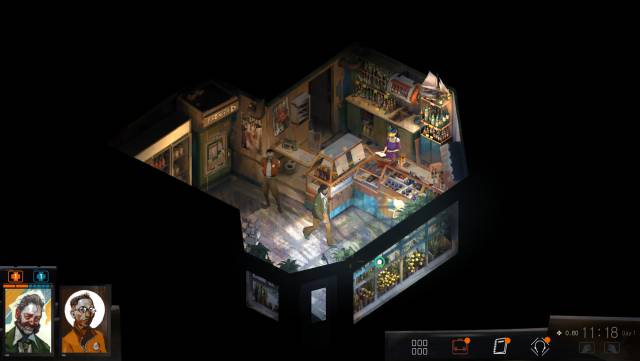
One of the peculiarities of this world is that it is similar to ours. More than fantasy, what has been done here is to remix and "improve" the past of humanity, identifying and isolating the essences of history to reassemble them in a more colorful, but at the same time familiar way. There is no France or England, Italy, or Spain on Elysium Disc, but its spirit, its language and its circumstances are seen, mixed, blurred and mutated, but they are there. That is why Elysium has a point of fascination, it is our world and it is not at the same time. Our historical ideas and movements regarding class, race, religion or nation are present and share a name – nationalism, fascism, racism, communism, capitalism, anarchism … – but they are applied to a different context that allows us to see them under a New prism The combination of fantasy with realism makes our adventure live in a special way, with worn concepts that recover interest and surprise capacity here in a new context.
Just a detective
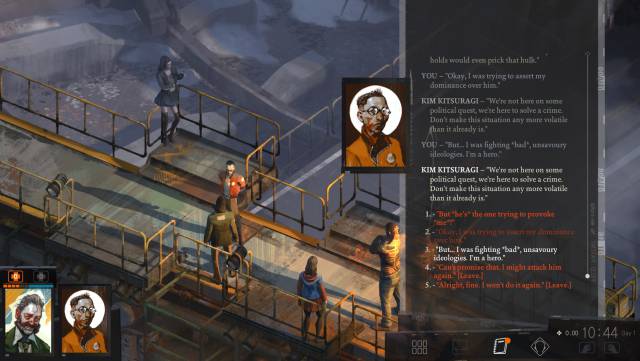
As we mentioned before, all these great ideas are far from the beginning of the game. We wake up without knowing who or what we are, we don't even know our name, or where our shoes are. Amnesia is one of the most popular resources of the video game, a narrative trick that allows us to define our identity without being tied to the protagonist's past, but that demands style and poise to be carried out in a way that does not seem forced or ridiculous, in theory. The creators of Disco Elysium have enough confidence in themselves to curl the curl and navigate this resource by forcing it and making it ridiculous, if we want. Because we are talking about a game of extremes, in which the player is encouraged to make radical decisions and attitudes in many aspects, and that makes him defy any conventionalism. In addition, it is a bit disguised nod to the great reference of the team, to that disconcerting and brilliant start with Nameless One in Planescape: Torment, which is achieved to honor with all the honors.
But presenting the due respect, this game goes its way, which is to present a true role-playing detective and investigation story, one that is not subject to what is expected of the genre. Ask, inquire, convince, threaten … ultimately investigate, look for witnesses, explore crime scenes and contrast our character's abilities with the mystery presented to us, knowing that their strengths, weaknesses and our own decisions will be key to lead the story in one direction or another.
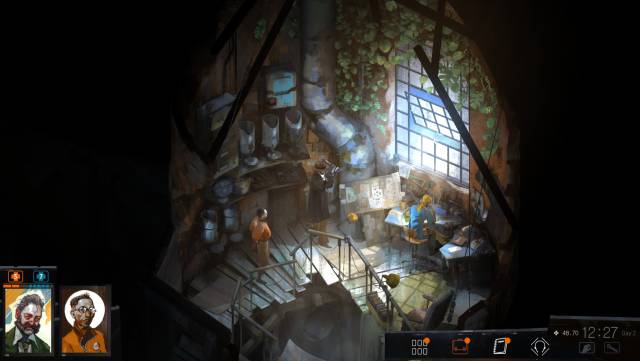
We talked earlier (here) about the character creation system, also very independent of the idea expected of an RPG. The fundamental thing to understand is that each of the 24 attributes that make up the character creation screen are not simple numbers to match, but are aspects of our detective's mind. With enough value, these attributes will be part of your inner voice and will give you advice within your domain area; if they are high enough and luck accompanies us, they will be successful advice (not infallible). All these attributes have their own personality, their virtues and their vices, and that there are times that they will fight among themselves to make you see which is the best option. We are used to the attributes being absolute maximums: a character with high intelligence can overcome challenges and dialogues that require intelligence; Games with more sophisticated dialogue systems can ask for a combination of factors (degree of affinity with the interlocutor, combination of several features, etc …), but they are still binary conditions: triumphs or failures in the attempt. In Disco Asylum things are not so clear: you may think that you have “won” a situation by overcoming a response based on pure logic, but that it ends up being harmful because your empathy was not high enough to warn you that that particular response did not It was going to be well received, no matter how logically impeccable it was.
It is necessary to emphasize that the game uses and abuses virtual dice to control its systems. If we want to punch someone, we will have many more possibilities if we are a character with high physical values, but still we will have to counter our attributes (and a series of possible modifiers) to the designs of the fortune goddess. The fact that there is a critical failure – two – and sure success – two – guarantees that we can fail even if we are very fit, or succeed, even if we are denied in the category in question. That random element will not be everyone's taste, but it is also all designed to accommodate successes and failures so that both are satisfactory. There are not many situations in which a failure can mean the end of the game, but when it happens it is often a hoot – yes, it is better to save frequently and take note of how not to fall into those situations to continue in a satisfactory way.
No combat
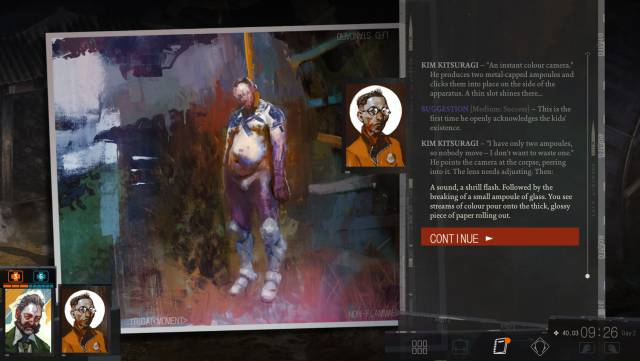
All this is very good on paper, but the fundamental element that enhances the ZA / UM bet is that they have had the courage to completely eliminate the combat from the equation. Many RPGs have had narrative aspirations and have tried to ensure that they have an impact on the struggle – so that an intelligent, cunning or charismatic character finds ways to avoid conflict. Some have even been able to reach nonviolence formulas in which a game can be completed without killing. But in Disco Elysium it is not a question of having more, less or no combat: it does not exist as such. There is violence of course, and (counted) action sequences linked to our attributes, but it does not fight in the traditional sense, it is all part of the same dialogue system, creating a really special combination, with a fluid narrative and a wide variety of results , styles and trajectories that can be developed. There is nothing that distracts us from playing the character we want to be, since the whole game is devoted to that element.
Obviously, there are people who greatly enjoy combat, evolve their character and overcome tactical challenges. You will not find any of that here and it should be clear that it is not the kind of game you will enjoy. There are no challenges, no obstacles, no puzzles, no fighting, but at the same time it is not a Visual Novel with linear or bifurcated paths in which we adopt a rather passive role, since we are constantly making decisions on how to evolve to our character, about the dialogues, the costumes and the intimate thoughts of the protagonist. It is a different, evolved way of facing a purely narrative game, in which the tremendous figure of one million words has been invested to execute that vision of freedom and reactivity, a record figure that justifies (or will have to do so in the absence of another alternative) the absence of a translation into any language other than English.
Born to be wild
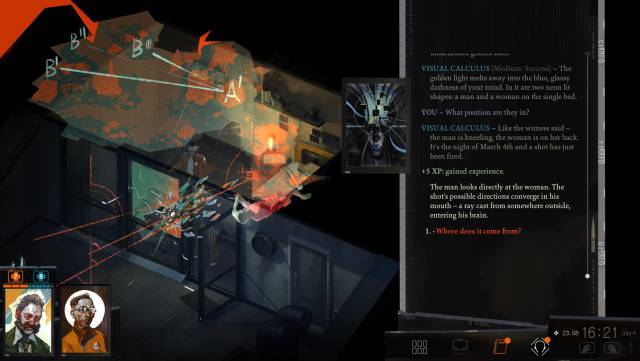
One of the most striking aspects of Disco Elysium is the constant invitation to be an extreme character. Apart from the characteristics that we have commented, there are a multitude of thoughts that we can internalize to adopt them as our own, which will open new possibilities and options for dialogue, although they can also give us disadvantages. For example, you can internalize the idea of being a nationalist who regrets the occupation of his country and is proud of his past, which will give us options that will allow us to sympathize with certain characters, but that will provoke the antipathy of others. The amount of thoughts that we can internalize is enormous and we will have to choose between a limited number of assimilating them, but the lack of complexes when adopting archetypes as controversial as that of a racist, a communist or a fascist, with dialogue options, is surprising quite strong – yes, at the same time that the extremes are encouraged, the game does not fall short to criticize and ridicule various usual elements of these ideologies.
They are not all of that court. By internalizing thoughts we can learn more about something concrete that can be useful to us at a given time, or embody different police archetypes – the cool cop, the failed cop, the tramp cop, the hard cop … – and different character traits that we can outsource Do we want to be the dirty brother of Dirty Harry? We can, do we want to be a finished drug addict who solves his cases based on speed? We can, do we want to be the heir of Sherlock Holmes? It is also possible, and many other things. As a whole, Disco Elysium has one of the best systems for creating and developing more different, striking and interesting characters, not only in recent years, but in the history of the genre. The possibilities are so many and the results are so diverse that in spite of the many hours that a campaign can take us, we will want to start another to be able to see things from another angle and with other “weapons” within our reach.
A moving box
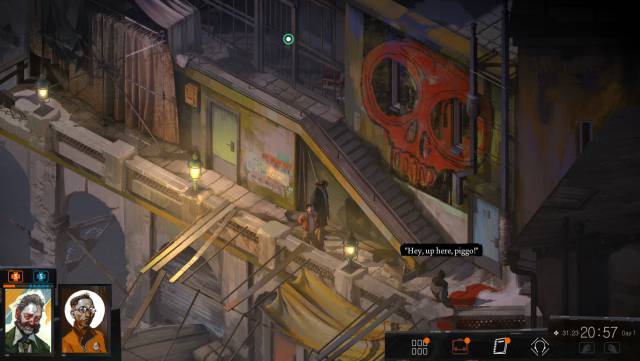
Another of the special elements of the Estonian game is its art. The premise has been to imitate the sensations of the games in Infinity Engine, but at the same time fight for all means so that their aesthetics were not the usual video game. ZA / UM is at its core a group of artists from different disciplines, including graphic arts, and there has been much insistence that the game have a unique aesthetic. The solution found is quite bright within the limitations of budget and labor, presenting hand-painted scenarios, with fair interactive elements, and using a system of lights and shadows, plus some effects that bring the stage to life despite the little movement of its streets.
The result manages to create the feeling of being before a luxurious interactive graphic novel. The little movement in the streets also contributes to the melancholy that the game gives off, so that the limitation ends up being appropriate for the ricón of the world and the historical moment in which we are. The set is just nickel-plated thanks to the fabulous illustrations that can be seen in the portraits of the characters or in the interface (attention to the wonderful illustrations that serve to represent the different attributes, magnificent). The visual richness of the set is commendable and, although the seams are visible and the difference is obvious with more modern productions and with more budget, Disco Elysium does not lose the site and achieves something remarkable.
CONCLUSION
It is not a game for everyone, of course, but it is also what many lovers of a certain type of role we have been waiting for a long time. And it comes to us without adulteration, pure and without compromises. Those of us who played Planescape: Torment and could not wait to finish fighting with rats and caterpillars in order to continue with the story, we wondered why? Why does such a superlative game have to have such bland combat to justify its existence? The answer comes to us now, almost 20 years later (curious, the 20th anniversary is at the corner door): it was not necessary, it has never been done, excellence does not require action, only commitment is needed and some brilliant writers willing to leave the eyelashes writing a monumental work of which many will not read even half of the pages, because the goal is not to tell a story, but many, not as many as one's imagination allows, but enough to feel that It's your story, yours and personal and nobody else's. That is the magic that Disco Elysium achieves, a new beacon that marks a valid and necessary direction for the computerized role and that we hope will become a mirror in which other productions want to look into the future.
THE BEST
- One of the best interactive video game stories
- Its amount of nuances, a dark story that does not give up humor, cynicism or tenderness
- Dense and interesting characters, with various readings
- The huge variety of characters that we can embody in one man
- The system of attributes and thoughts is the most original of the genre
- Dialogues, in general, especially with the voices in your head
- Long and tremendously playable
WORST
- Only in English and with an elaborate language
- Perhaps excessively dependent on chance
- It is possible to create a character that is not prepared for certain circumstances, (although game over can also be memorable)
Excellent
A benchmark title in its genre, which stands out above its competitors and that you will enjoy from beginning to end, surely several times. A game destined to become a classic over the years.
